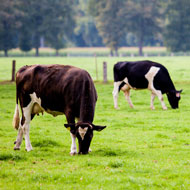
Antibiotic footbaths for cattle are “an obvious target” for reducing antimicrobial use, scientists say, as new research shows they account for the largest volume of antibiotics being dispersed into the food chain.
Nottingham vet school has now developed a new online tool to help vets and farmers monitor and reduce antibiotic use in dairy herds.
A research team from the University of Nottingham studied antibiotic use in a large sample of dairy farms. According to the findings, a quarter of the farms used 50 per cent of the total antibiotics used by all farms in a year.
The study, published in Vet Record, is the first published research on antimicrobial use in British dairy herds, as well as factors associated with high usage.
Scientists analysed 358 dairy farms, including 81,000 cattle, over a 12-month period. The majority of antibiotic use was via injections, accounting for around 78 per cent of the antibiotics used or sold to the farms.
“What stood out as particularly surprising was the effects of the use of antibiotics in footbaths for conditions like digital dermatitis,” said senior clinical training scholar Robert Hyde.
“Footbaths for cattle can use phenomenal quantities of antimicrobials, and represent an obvious target for the rapid reduction of antimicrobial usage.”
The university’s new tool - the Nottingham University Dairy Antimicrobial Usage (AMU) Calculator - can be used in the field. It is available for free download from the AHDB website.
Edward Bailey from the George Veterinary Group in Wiltshire is already using the calculator.
He said: “This new tool is proving really useful to compare antimicrobial use between farms. It has helped cut through the confusion of different systems of measurement.
“It has been easier to effect change being able to display graphically to farmers their critically important antimicrobial usage and how particular patterns of use (e.g. footbath) can hugely affect how they compare with others.”



 The latest
The latest